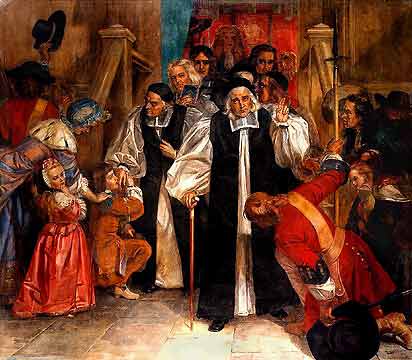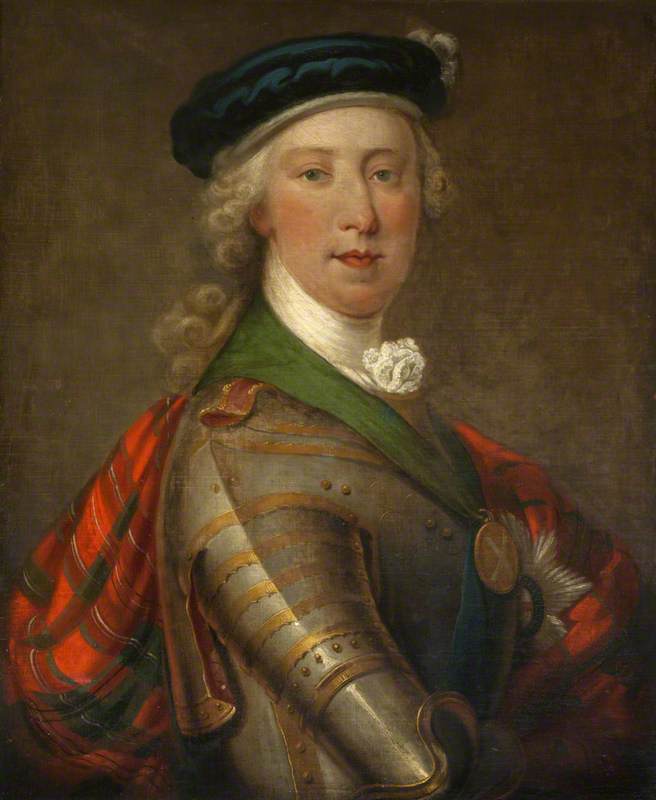|
Nonjuring Schism
The Nonjuring schism refers to a split in the State religion, established churches of Church of England, England, Scottish Episcopal Church, Scotland and Church of Ireland, Ireland, following the deposition and exile of James II of England, James II and VII in the 1688 Glorious Revolution. As a condition of office, clergy were required to swear allegiance to the ruling monarch; for various reasons, some refused to take the oath to his successors William III of England, William III and II and Mary II of England, Mary II. These individuals were referred to as ''Non-juring'', from the Latin verb ''iūrō'', or ''jūrō'', meaning "to swear an oath". In the Church of England, an estimated 2% of priests refused to swear allegiance in 1689, including nine bishops. Ordinary clergy were allowed to keep their positions but after efforts to compromise failed, the six surviving bishops were removed in 1691. The schismatic Non-Juror Church was formed in 1693 when William Lloyd (bishop of Nor ... [...More Info...] [...Related Items...] OR: [Wikipedia] [Google] [Baidu] |
Charles Edward Stuart
Charles Edward Louis John Sylvester Maria Casimir Stuart (31 December 1720 – 30 January 1788) was the elder son of James Francis Edward Stuart, making him the grandson of James VII and II, and the Stuart claimant to the thrones of England, Scotland, and Ireland from 1766 as Charles III. During his lifetime, he was also known as "the Young Pretender" and "the Young Chevalier"; in popular memory, he is known as Bonnie Prince Charlie. Born in Rome to the exiled Stuart court, he spent much of his early and later life in Italy. In 1744, he travelled to France to take part in a planned invasion to restore the Stuart monarchy under his father. When storms partly wrecked the French fleet, Charles resolved to proceed to Scotland following discussion with leading Jacobites. This resulted in Charles landing by ship on the west coast of Scotland, leading to the Jacobite rising of 1745. The Jacobite forces under Charles initially achieved several victories in the field, including the Ba ... [...More Info...] [...Related Items...] OR: [Wikipedia] [Google] [Baidu] |
Schism
A schism ( , , or, less commonly, ) is a division between people, usually belonging to an organization, movement, or religious denomination. The word is most frequently applied to a split in what had previously been a single religious body, such as the Great East–West Schism or the Western Schism. It is also used of a split within a non-religious organization or movement or, more broadly, of a separation between two or more people, be it brothers, friends, lovers, etc. A schismatic is a person who creates or incites schism in an organization or who is a member of a splinter group. Schismatic as an adjective means pertaining to a schism or schisms, or to those ideas, policies, etc. that are thought to lead towards or promote schism. In religion, the charge of schism is distinguished from that of heresy, since the offence of schism concerns not differences of belief or doctrine but promotion of, or the state of division, especially among groups with differing pastoral jurisdict ... [...More Info...] [...Related Items...] OR: [Wikipedia] [Google] [Baidu] |
Wars Of The Three Kingdoms
The Wars of the Three Kingdoms were a series of conflicts fought between 1639 and 1653 in the kingdoms of Kingdom of England, England, Kingdom of Scotland, Scotland and Kingdom of Ireland, Ireland, then separate entities in a personal union under Charles I of England, Charles I. They include the 1639 to 1640 Bishops' Wars, the First English Civil War, First and Second English Civil Wars, the Irish Confederate Wars, the Cromwellian conquest of Ireland and the Anglo-Scottish war (1650–1652), Anglo-Scottish War of 1650–1652. They resulted in the execution of Charles I, the abolition of monarchy, and founding of the Commonwealth of England, a unitary state which controlled the British Isles until the Stuart Restoration in 1660. Political and religious conflict between Charles I and his opponents dated to the early years of his reign. While the vast majority supported the institution of monarchy, they disagreed on who held ultimate authority. Cavalier, Royalists generally argued ... [...More Info...] [...Related Items...] OR: [Wikipedia] [Google] [Baidu] |
Ulster
Ulster (; or ; or ''Ulster'') is one of the four traditional or historic provinces of Ireland, Irish provinces. It is made up of nine Counties of Ireland, counties: six of these constitute Northern Ireland (a part of the United Kingdom); the remaining three are in the Republic of Ireland. It is the second-largest (after Munster) and second-most populous (after Leinster) of Ireland's four traditional provinces, with Belfast being its biggest city. Unlike the other provinces, Ulster has a high percentage of Protestantism in Ireland, Protestants, making up almost half of its population. English is the main language and Ulster English the main dialect. A minority also speak Irish, and there are (Irish-speaking regions) in County Donegal which is home to a quarter of the total Gaeltacht population of the Republic of Ireland. There are also large Irish-speaking networks in southern County Londonderry and in the Gaeltacht Quarter, Belfast. Ulster Scots dialect, Ulster-Scots is al ... [...More Info...] [...Related Items...] OR: [Wikipedia] [Google] [Baidu] |
Act Of Uniformity 1662
The Act of Uniformity 1662 ( 14 Cha. 2. c. 4) is an act of the Parliament of England. (It was formerly cited as 13 & 14 Cha. 2. c. 4, by reference to the regnal year when it was passed on 19 May 1662.) It prescribed the form of public prayers, administration of sacraments, and other rites of the Established Church of England, according to the rites and ceremonies prescribed in the 1662 ''Book of Common Prayer''. Adherence to this was required in order to hold any office in government or the church, although the new version of the ''Book of Common Prayer'' prescribed by the Act was so new that most people had never even seen a copy. The Act also required that the ''Book of Common Prayer'' "be truly and exactly Translated into the British or Welsh Tongue". It also explicitly required episcopal ordination for all ministers, i.e. deacons, priests and bishops, which had to be reintroduced since the Puritans had abolished many features of the Church during the Civil War. The a ... [...More Info...] [...Related Items...] OR: [Wikipedia] [Google] [Baidu] |
Nonconformist (Protestantism)
Nonconformists are Protestant Christians who do not "conform" to the governance and usages of the established church in England, and in Wales until 1914, the Church of England. Use of the term ''Nonconformist'' in England and Wales was precipitated by the Restoration of the Stuart monarchy in 1660, when the Act of Uniformity 1662 renewed opposition to reforms within the established church. By the late 19th century the term specifically included other Reformed Christians ( English Presbyterians and Congregationalists), plus the Baptists, Brethren, Methodists, and Quakers. English Dissenters, such as the Puritans, who violated the Act of Uniformity 1558 – typically by practising radical, sometimes separatist, dissent – were retrospectively labelled as Nonconformists. In Ireland, the comparable term until the Church of Ireland's disestablishment in 1869 was Dissenter (the term earlier used in England), commonly referring to Irish Presbyterians who dissented from th ... [...More Info...] [...Related Items...] OR: [Wikipedia] [Google] [Baidu] |
Protestantism
Protestantism is a branch of Christianity that emphasizes Justification (theology), justification of sinners Sola fide, through faith alone, the teaching that Salvation in Christianity, salvation comes by unmerited Grace in Christianity, divine grace, the priesthood of all believers, and the Bible as the sole infallible source of authority for Christian faith and practice. The five solae, five ''solae'' summarize the basic theological beliefs of mainstream Protestantism. Protestants follow the theological tenets of the Reformation, Protestant Reformation, a movement that began in the 16th century with the goal of reforming the Catholic Church from perceived Criticism of the Catholic Church, errors, abuses, and discrepancies. The Reformation began in the Holy Roman Empire in 1517, when Martin Luther published his ''Ninety-five Theses'' as a reaction against abuses in the sale of indulgences by the Catholic Church, which purported to offer the remission of the Purgatory, temporal ... [...More Info...] [...Related Items...] OR: [Wikipedia] [Google] [Baidu] |
Elder (Christianity)
In Christianity, an elder is a person who is valued for wisdom and holds a position of responsibility and authority in a Christian group. In some Christian traditions (e.g., Eastern Orthodoxy, Roman Catholicism, Anglicanism, Methodism) an ''elder'' is an ordained person who serves a local church or churches and who has been ordained to a ministry of word, sacrament and order, filling the preaching and pastoral offices. In other Christian traditions (e.g., Presbyterianism, Churches of Christ, Plymouth Brethren), an elder may be a lay person serving as an administrator in a local congregation, or be ordained and serving in preaching (teaching during church gatherings) or pastoral roles. There is a distinction between ordained elders and lay elders. The two concepts may be conflated in everyday conversation (for example, a lay elder in the Baptist tradition may be referred to as "clergy", especially in America). In non-Christian world cultures the term elder refers to age and exper ... [...More Info...] [...Related Items...] OR: [Wikipedia] [Google] [Baidu] |
Episcopal Polity
An episcopal polity is a hierarchical form of church governance in which the chief local authorities are called bishops. The word "bishop" here is derived via the British Latin and Vulgar Latin term ''*ebiscopus''/''*biscopus'', . It is the structure used by many of the major Christian Churches and denominations, such as the Catholic, Eastern Orthodox, Oriental Orthodox, Church of the East, Anabaptist, Lutheran, and Anglican churches or denominations, and other churches founded independently from these lineages. Many Methodist denominations have a form of episcopal polity known as connexionalism. History Churches with an episcopal polity are governed by bishops, practising their authorities in the dioceses and conferences or synods. Their leadership is both sacramental and constitutional; as well as performing ordinations, confirmations, and consecrations, the bishop supervises the clergy within a local jurisdiction and is the representative both to secular structure ... [...More Info...] [...Related Items...] OR: [Wikipedia] [Google] [Baidu] |
Episcopal Church (United States)
The Episcopal Church (TEC), also known as the Protestant Episcopal Church in the United States of America (PECUSA), is a member of the worldwide Anglican Communion, based in the United States. It is a mainline Protestant denomination and is divided into nine Ecclesiastical provinces and dioceses of the Episcopal Church, provinces. The current presiding bishop of the Episcopal Church is Sean Rowe, Sean W. Rowe. In 2023, the Episcopal Church had 1,547,779 members. it was the 14th largest denomination in the United States. Note: The number of members given here is the total number of baptized members in 2012 (cf. #refBaptizedMembers2012, Baptized Members by Province and Diocese 2002–2013). In 2025, Pew Research Center, Pew Research estimated that 1 percent of the adult population in the United States, or 2.6 million people, self-identify as mainline Episcopalians. The church has declined in membership and Sunday attendance since the 1960s, particularly in the Northeastern Uni ... [...More Info...] [...Related Items...] OR: [Wikipedia] [Google] [Baidu] |







